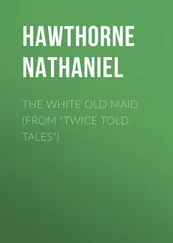“It is well,” cried old Moodie. “Keep your wealth. You are right worthy of it. Keep it, therefore, but with one condition only.”
Zenobia thought the old man beside himself, and was moved with pity.
“Have you none to care for you?” asked she. “No daughter? — no kind-hearted neighbor? — no means of procuring the attendance which you need? Tell me once again, can I do nothing for you?”
“Nothing,” he replied. “I have beheld what I wished. Now leave me. Linger not a moment longer, or I may be tempted to say what would bring a cloud over that queenly brow. Keep all your wealth, but with only this one condition: Be kind — be no less kind than sisters are — to my poor Priscilla!”
And, it may be, after Zenobia withdrew, Fauntleroy paced his gloomy chamber, and communed with himself as follows, — or, at all events, it is the only solution which I can offer of the enigma presented in his character: — ”I am unchanged, — the same man as of yore!” said he. “True, my brother’s wealth — he dying intestate — is legally my own. I know it; yet of my own choice, I live a beggar, and go meanly clad, and hide myself behind a forgotten ignominy. Looks this like ostentation? Ah! but in Zenobia I live again! Beholding her, so beautiful, — so fit to be adorned with all imaginable splendor of outward state, — the cursed vanity, which, half a lifetime since, dropt off like tatters of once gaudy apparel from my debased and ruined person, is all renewed for her sake. Were I to reappear, my shame would go with me from darkness into daylight. Zenobia has the splendor, and not the shame. Let the world admire her, and be dazzled by her, the brilliant child of my prosperity! It is Fauntleroy that still shines through her!” But then, perhaps, another thought occurred to him.
“My poor Priscilla! And am I just to her, in surrendering all to this beautiful Zenobia? Priscilla! I love her best, — I love her only! — but with shame, not pride. So dim, so pallid, so shrinking, — the daughter of my long calamity! Wealth were but a mockery in Priscilla’s hands. What is its use, except to fling a golden radiance around those who grasp it? Yet let Zenobia take heed! Priscilla shall have no wrong!” But, while the man of show thus meditated, — that very evening, so far as I can adjust the dates of these strange incidents, — Priscilla poor, pallid flower! — was either snatched from Zenobia’s hand, or flung wilfully away!
Table of Contents
Well, I betook myself away, and wandered up and down, like an exorcised spirit that had been driven from its old haunts after a mighty struggle. It takes down the solitary pride of man, beyond most other things, to find the impracticability of flinging aside affections that have grown irksome. The bands that were silken once are apt to become iron fetters when we desire to shake them off. Our souls, after all, are not our own. We convey a property in them to those with whom we associate; but to what extent can never be known, until we feel the tug, the agony, of our abortive effort to resume an exclusive sway over ourselves. Thus, in all the weeks of my absence, my thoughts continually reverted back, brooding over the bygone months, and bringing up incidents that seemed hardly to have left a trace of themselves in their passage. I spent painful hours in recalling these trifles, and rendering them more misty and unsubstantial than at first by the quantity of speculative musing thus kneaded in with them. Hollingsworth, Zenobia, Priscilla! These three had absorbed my life into themselves. Together with an inexpressible longing to know their fortunes, there was likewise a morbid resentment of my own pain, and a stubborn reluctance to come again within their sphere.
All that I learned of them, therefore, was comprised in a few brief and pungent squibs, such as the newspapers were then in the habit of bestowing on our socialist enterprise. There was one paragraph, which if I rightly guessed its purport bore reference to Zenobia, but was too darkly hinted to convey even thus much of certainty. Hollingsworth, too, with his philanthropic project, afforded the penny-a-liners a theme for some savage and bloody minded jokes; and, considerably to my surprise, they affected me with as much indignation as if we had still been friends.
Thus passed several weeks; time long enough for my brown and toil-hardened hands to reaccustom themselves to gloves. Old habits, such as were merely external, returned upon me with wonderful promptitude. My superficial talk, too, assumed altogether a worldly tone. Meeting former acquaintances, who showed themselves inclined to ridicule my heroic devotion to the cause of human welfare, I spoke of the recent phase of my life as indeed fair matter for a jest. But, I also gave them to understand that it was, at most, only an experiment, on which I had staked no valuable amount of hope or fear. It had enabled me to pass the summer in a novel and agreeable way, had afforded me some grotesque specimens of artificial simplicity, and could not, therefore, so far as I was concerned, be reckoned a failure. In no one instance, however, did I voluntarily speak of my three friends. They dwelt in a profounder region. The more I consider myself as I then was, the more do I recognize how deeply my connection with those three had affected all my being.
As it was already the epoch of annihilated space, I might in the time I was away from Blithedale have snatched a glimpse at England, and been back again. But my wanderings were confined within a very limited sphere. I hopped and fluttered, like a bird with a string about its leg, gyrating round a small circumference, and keeping up a restless activity to no purpose. Thus it was still in our familiar Massachusetts — in one of its white country villages — that I must next particularize an incident.
The scene was one of those lyceum halls, of which almost every village has now its own, dedicated to that sober and pallid, or rather drab-colored, mode of winter-evening entertainment, the lecture. Of late years this has come strangely into vogue, when the natural tendency of things would seem to be to substitute lettered for oral methods of addressing the public. But, in halls like this, besides the winter course of lectures, there is a rich and varied series of other exhibitions. Hither comes the ventriloquist, with all his mysterious tongues; the thaumaturgist, too, with his miraculous transformations of plates, doves, and rings, his pancakes smoking in your hat, and his cellar of choice liquors represented in one small bottle. Here, also, the itinerant professor instructs separate classes of ladies and gentlemen in physiology, and demonstrates his lessons by the aid of real skeletons, and manikins in wax, from Paris. Here is to be heard the choir of Ethiopian melodists, and to be seen the diorama of Moscow or Bunker Hill, or the moving panorama of the Chinese wall. Here is displayed the museum of wax figures, illustrating the wide catholicism of earthly renown, by mixing up heroes and statesmen, the pope and the Mormon prophet, kings, queens, murderers, and beautiful ladies; every sort of person, in short, except authors, of whom I never beheld even the most famous done in wax. And here, in this many-purposed hall (unless the selectmen of the village chance to have more than their share of the Puritanism, which, however diversified with later patchwork, still gives its prevailing tint to New England character), — here the company of strolling players sets up its little stage, and claims patronage for the legitimate drama.
But, on the autumnal evening which I speak of, a number of printed handbills — stuck up in the bar-room, and on the sign-post of the hotel, and on the meetinghouse porch, and distributed largely through the village — had promised the inhabitants an interview with that celebrated and hitherto inexplicable phenomenon, the Veiled Lady!
Читать дальше












